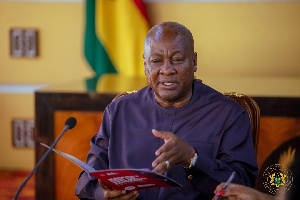- Home - News
- Elections 2024
- News Archive
- Crime & Punishment
- Politics
- Regional
- Editorial
- Health
- Ghanaians Abroad
- Tabloid
- Africa
- Religion
- Photo Archives
- Press Release
General News of Tuesday, 13 May 2025
Source: www.ghanawebbers.com
Minority considers Mahama impeachment over constitutional breaches
The Minority in Parliament is considering impeachment proceedings against President John Dramani Mahama. They cite violations of the Constitution, especially Article 60 on presidential succession.
This decision follows unrest among New Patriotic Party MPs. They are upset that President Mahama left the country while both the Vice President and Speaker of Parliament were absent.
According to the Constitution, leadership passes to the Vice President, then the Speaker, and finally the Chief Justice when the President is away. However, the Chief Justice is currently suspended and has an acting replacement. Opposition legislators argue this creates a "constitutional vacuum" without a formal swearing-in ceremony.
John Darko, legal counsel for the Minority, warned during JoyFM's Midday News on May 13. He stated they would not be passive observers in this situation.
He criticized President Mahama for leaving the country and violating constitutional duties. Darko emphasized that they would raise these issues and consider impeachment if necessary.
The Minority also expressed concerns about potential future violations. They fear that allowing current breaches could lead to more serious issues, like a third presidential term attempt.
Darko pointed out that if constitutional violations continue unchecked, it could threaten human rights as well. He stressed that accountability is crucial for upholding constitutional order.
He reminded everyone that when Mahama took office, he swore to uphold the Constitution. If he violates it, he should face consequences. Darko urged Ghanaians to demand answers regarding possible impeachment.
Meanwhile, opinions among constitutional law experts vary on this issue. Some believe the Minority has a valid case due to an alleged constitutional vacuum. Others argue that an acting Chief Justice can fulfill duties without formal inauguration.
Here’s a brief summary of Article 60 from Ghana's 1992 Constitution:
1. There shall be a Vice-President who performs functions assigned by this Constitution or by the President.
2. A candidate for Vice-President must be designated by the Presidential candidate before elections.
3. Provisions of Article 62 apply to candidates for Vice-President.
4. A candidate is deemed elected as Vice-President if their designated Presidential candidate wins.
5. The Vice-President must take oaths before performing their functions.
6. If the President dies or resigns, the Vice-President assumes office until term completion.
7. If serving over half a term as President, they can only serve one full term afterward.
8. When absent or unable to perform duties, the Vice-President takes over until their return.
9-10: The Vice-President must take oaths upon assuming presidential functions and nominate a new Vice-President with Parliament's approval.
11-12: If both are unable to serve, the Speaker of Parliament takes over after taking oaths.
13: A presidential election occurs within three months if both leaders are unable to serve due to death or resignation.
14: Article 69 applies for removing a Vice-President from office.











